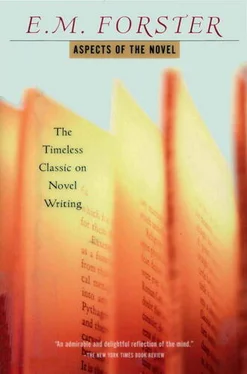Let us define a plot. We have defined a story as a narrative of events arranged in their time-sequence. A plot is also a narrative of events, the emphasis falling on causality. "The king died and then the queen died" is a story. "The king died, and then the queen died of grief" is a plot. The time-sequence is preserved, but the sense of causality overshadows it. Or again: "The queen died, no one knew why, until it was discovered that it was through grief at the death of the king." This is a plot with a mystery in it, a form capable of high development. It suspends the time-sequence, it moves as far away from the story as its limitations will allow. Consider the death of the queen. If it is in a story we say "and then?" If it is in a plot we ask "why?" That is the fundamental difference between these two aspects of the novel. A plot cannot be told to a gaping audience of cave-men or to a tyrannical sultan or to their modern descendant the movie-public. They can only be kept awake by "and then—and then " They can only supply curiosity. But a plot demands intelligence and memory also.
Curiosity is one of the lowest of the human faculties. You will have noticed in daily life that when people are inquisitive they nearly always have bad memories and are usually stupid at bottom. The man who begins by asking you how many brothers and sisters you have is never a sympathetic character., and if you meet him in a year's time he will probably ask you how many brothers and sisters you have, his mouth again sagging open, his eyes still bulging from his head. It is difficult to be friends with such a man, and for two inquisitive people to be friends must be impossible. Curiosity by itself takes us a very little way, nor does it take us far into the novel—only as far as the story. If we would grasp the plot we must add intelligence and memory.
Intelligence first. The intelligent novel-reader, unlike the inquisitive one who just runs his eye over a new fact, mentally picks it up. He sees it from two points of view: isolated, and related to the other facts that he has read on previous pages. Probably he does not understand it, but he does not expect to do so yet awhile. The facts in a highly organized novel (like The Egoist) are often of the nature of cross-correspondences and the ideal spectator cannot expect to view them properly until he is sitting up on a hill at the end. This element of surprise or mystery—the detective element as it is sometimes rather emptily called—is of great importance in a plot. It occurs through a suspension of the time-sequence; a mystery is a pocket in time, and it occurs crudely, as in "Why did the queen die?" and more subtly in half-explained gestures and words, the true meaning of which only dawns pages ahead. Mystery is essential to a plot, and cannot be appreciated without intelligence. T o the curious it is just another "and then—" T o appreciate a mystery, part of the mind must be left behind, brooding, while the other part goes marching on.
That brings us to our second qualification: memory.
Memory and intelligence are closely connected, for unless we remember we cannot understand. If by the time the queen dies we have forgotten the existence of the king we shall never make out what killed her. The plot-maker expects us to remember, we expect him to leave no loose ends. Every action or word ought to count; it ought to be economical and spare; even when complicated it should be organic and free from dead-matter. It may be difficult or easy, it may and should contain mysteries, but it ought not to mislead. And over it, as it unfolds, will hover the memory of the reader (that dull glow of the mind of which intelligence is the bright advancing edge) and will constantly rearrange and reconsider, seeing new clues, new chains of cause and effect, and the final sense (if the plot has been a fine one) will not be of clues or chains, but of something aesthetically compact, something which might have been shown by the novelist straight away, only if he had shown it straight away it would never have become beautiful. We come up against beauty here— for the first time in our inquiry: beauty at which a novelist should never aim, though he fails if he does not achieve it. I will conduct beauty to her proper place later on. Meanwhile please accept her as part of a completed plot. She looks a little surprised at being there, but beauty ought to look a little surprised: it is the emotion that best suits her face, as Botticelli knew when he painted her risen from the waves, between the winds and the flowers. The beauty who does not look surprised, who accepts her position as her due—she reminds us too much of a prima donna.
But let us get back to the plot, and we will do so via George Meredith.
Meredith is not the great name he was twenty or thirty years ago, when much of the universe and all Cambridge trembled. I remember how depressed I used to be by a line in one of his poems: "We live but to be sword or block." I did not want to be either and I knew that I was not a sword. It seems though that there was no real cause for depression, for Meredith is himself now rather in the trough of a wave, and though fashion will turn and raise him a bit, he will never be the spiritual power he was about the year 1900. His philosophy has not worn well. His heavy attacks on sentimentality—they bore the present generation, which pursues the same quarry but with neater instruments, and is apt to suspect anyone carrying a blunderbuss of being a sentimentalist himself. And his visions of Nature— they do not endure like Hardy's, there is too much Surrey about them, they are fluffy and lush. He could no more write the opening chapter of The Return of the Native than Box Hill could visit Salisbury Plain. What is really tragic and enduring in the scenery of England was hidden from him, and so is what is really tragic in life. When he gets serious and noble-minded there is a strident overtone, a bullying that becomes distressing. I feel indeed that he was like Tennyson in one respect: through not taking himself quietly enough he strained his inside. And his novels: most of the social values are faked. The tailors are not tailors, the cricket matches are not cricket, the railway trains do not even seem to be trains, the county families give the air of having been only just that moment unpacked, scarcely in position before the action starts, the straw still clinging to their beards. It is surely very odd, the social scene in which his characters are set: it is partly due to his fantasy, which is legitimate, but partly a chilly fake, and wrong. What with the faking, what with the preaching, which was never agreeable and is now said to be hollow, and what with the home counties posing as the universe, it is no wonder Meredith now lies in the trough. And yet he is in one way a great novelist. He is the finest contriver that English fiction has ever produced, and any lecture on plot must do homage to him.
Meredith's plots are not closely knit. We cannot describe the action of Harry Richmond in a phrase, as we can that of Great Expectations, though both books turn on the mistake made by a young man as to the sources of his fortune. A Meredithian plot is not a temple to the tragic or even to the comic Muse, but rather resembles a series of kiosks most artfully placed among wooded slopes, which his people reach by their own impetus, and from which they emerge with altered aspect. Incident springs out of character, and having occurred it alters that character. People and events are closely connected, and he does it by means of these contrivances. They are often delightful, sometimes touching, always unexpected. This shock, followed by the feeling, "Oh, that's all right," is a sign that all is well with the plot: characters, to be real, ought to run smoothly, but a plot ought to cause surprise. The horse-whipping of Dr. Shrapnel in Beauchamp's Career is a surprise. We know that Everard Romfrey must dislike Shrapnel, must hate and misunderstand his radicalism, and be jealous of his influence over Beauchamp: we watch too the growth of the misunderstanding over Rosamund, we watch the intrigues of Cecil Baskelett. As far as characters go, Meredith plays with his cards on the table, but when the incident comes what a shock it gives us and the characters too! The tragi-comic business of one old man whipping another from the highest motives—it reacts upon all their world, and transforms all the personages of the book. It is not the centre of Beauchamp's Career, which indeed has no centre. It is essentially a contrivance, a door through which the book is made to pass, emerging in an altered form. Towards the close, when Beau-champ is drowned and Shrapnel and Romfrey are reconciled over his body, there is an attempt to elevate the plot to Aristotelian symmetry, to turn the novel into a temple wherein dwells interpretation and peace. Meredith fails here: Beauchamp's Career remains a series of contrivances (the visit to France is another of them), but contrivances that spring from the characters and react upon them.
Читать дальше












